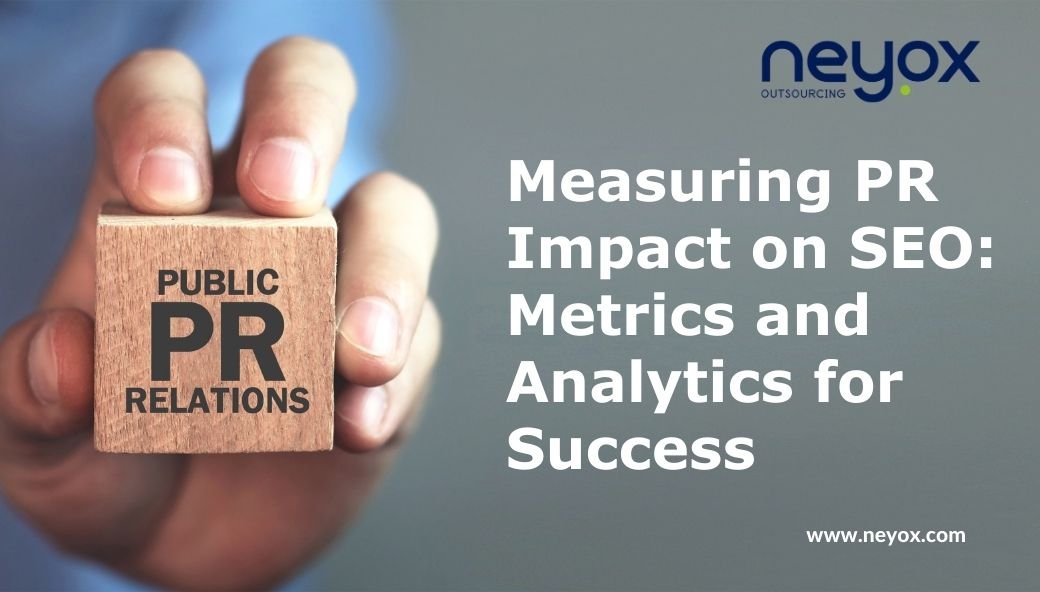
10 Apr Measuring PR Impact on SEO: Metrics and Analytics for Success
Introduction: In the ever-evolving landscape of digital marketing, the relationship between public relations (PR) and search engine optimization (SEO) has become increasingly intertwined. PR efforts can significantly impact a website’s SEO performance by generating backlinks, enhancing brand visibility, and improving online reputation. However, measuring the impact of PR on SEO requires a strategic approach and the use of relevant metrics and analytics. In this article, we’ll explore the importance of measuring PR impact on SEO and discuss key metrics and analytics for success.
Understanding the Relationship Between PR and SEO: Public relations and SEO are complementary disciplines that work together to achieve common goals, such as increasing brand awareness, credibility, and online visibility. PR activities, such as media outreach, press coverage, influencer partnerships, and content distribution, can directly impact a website’s SEO performance by generating high-quality backlinks, social signals, and brand mentions. These signals are valuable to search engines like Google, as they indicate the authority, relevance, and trustworthiness of a website, ultimately influencing its search rankings and organic traffic.
Importance of Measuring PR Impact on SEO: Measuring the impact of PR on SEO is essential for several reasons:
- Performance Evaluation: By tracking the effectiveness of PR efforts in driving SEO outcomes, businesses can assess the ROI of their PR strategies and make data-driven decisions to optimize future campaigns.
- Attribution and Accountability: Measuring PR impact on SEO allows businesses to attribute specific outcomes, such as backlink acquisition or brand visibility, to their PR activities. This helps demonstrate the value of PR to stakeholders and justify investment in PR initiatives.
- Optimization and Improvement: Analyzing PR impact on SEO provides insights into what works and what doesn’t, allowing businesses to refine their PR strategies, tactics, and messaging for better results.
Key Metrics and Analytics for Measuring PR Impact on SEO: To effectively measure the impact of PR on SEO, businesses should track a combination of quantitative and qualitative metrics across various stages of the customer journey. Here are key metrics and analytics to consider:
Backlink Acquisition: Backlinks are one of the most significant ways PR impacts SEO. Track the quantity and quality of backlinks acquired through PR efforts, including the domain authority of linking sites, anchor text distribution, and the relevance of linking pages to your target keywords and topics.
Tools: Use backlink analysis tools like Ahrefs, Moz, or SEMrush to monitor backlink growth, analyze the link profile, and identify new backlink opportunities.
Referral Traffic: Measure the volume and quality of referral traffic generated from PR-driven backlinks. Analyze referral traffic metrics such as sessions, bounce rate, time on page, and conversion rate to assess the effectiveness of PR campaigns in driving engaged and qualified visitors to your website.
Tools: Use Google Analytics to track referral traffic sources, behavior, and conversions attributed to PR-driven backlinks.
Brand Mentions and Sentiment: Monitor brand mentions and sentiment across online channels, including social media, news publications, blogs, and forums. Measure the volume, reach, and sentiment of brand mentions to gauge brand awareness, reputation, and sentiment impact resulting from PR efforts.
Tools: Use social media monitoring tools like Hootsuite, Mention, or Brandwatch to track brand mentions and sentiment across social media platforms. Additionally, use media monitoring services or tools like Google Alerts to monitor brand mentions in news articles and online publications.
Keyword Rankings: Track the impact of PR on keyword rankings and organic search visibility. Monitor changes in keyword rankings, search engine result page (SERP) features, and organic traffic for target keywords associated with PR campaigns and content.
Tools: Use SEO analytics tools like Google Search Console, SEMrush, or Ahrefs to track keyword rankings, search impressions, clicks, and average position over time.
Social Engagement: Measure social engagement metrics such as likes, shares, comments, and mentions across social media platforms for PR-related content. Assess the reach, engagement, and amplification of PR campaigns through social media analytics.
Tools: Use social media analytics platforms like Sprout Social, Buffer, or Hootsuite to track social engagement metrics and analyze the performance of PR-driven content on social media.
Online Reputation: Evaluate online reputation metrics, including online reviews, ratings, and sentiment, to assess the impact of PR on brand perception and reputation management. Monitor changes in online sentiment and customer feedback resulting from PR initiatives.
Tools: Use online reputation management tools like Brand24, Trustpilot, or Google My Business to monitor online reviews, ratings, and sentiment across review platforms and directories.
Conclusion: Measuring PR impact on SEO is essential for understanding the effectiveness of PR efforts in driving organic visibility, brand awareness, and online reputation. By tracking key metrics and analytics such as backlink acquisition, referral traffic, brand mentions, keyword rankings, social engagement, and online reputation, businesses can assess the ROI of their PR strategies and optimize future campaigns for greater success. By integrating PR and SEO efforts and leveraging data-driven insights, businesses can maximize the impact of PR on SEO and achieve their marketing objectives effectively.


